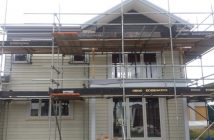This column doesn’t relate to my ‘built environment’ remit, at least not directly. Rather I would like to share an idea.
I’ve attended several conferences and events lately and observed common themes. On the one hand there is a sense of concern around government debt and levels of spending. On the other, we have an infrastructure deficit in the hundreds of billions of dollars, the result of decades of underinvestment.
The main conclusion drawn by speakers has been that in order to address the infrastructure deficit without spending excessively, we need to achieve better value-for-money (and also that it doesn’t all need to be funded by taxpayer money, but that’s a whole other article).
The consensus seems to be that one way of achieving this is by having a more stable, predictable pipeline of infrastructure projects, and to avoid wasteful changes of direction.
A recent example is the scrapping of the project to replace Cook Strait ferries, having already spent $424M. Without arguing whether it was a good decision, this shows the inefficiency of political decision-making around infrastructure.
Unfortunately, our politics are becoming more divided, and political discourse less productive. Social media is exacerbating existing divisions, and eroding our collective ability to make societal progress.
As a society, we need to address this challenge, or things will get worse rather than better. Arguing our own points of view online is unlikely to help us move forward. It’s reasonably well documented that humans are good at ignoring information that contradicts our own point of view. Rather, if we recognise that we need to broaden our perspectives in order to achieve more productive political discourse, a good way to do this is to have a personal conversation with someone who has a different opinion to our own.
In 2017, Jochen Wegner and the team from Zeit Online, an online German newspaper, realised this and began a project to see what would happen if they set up some conversations between strangers with differing views on key issues. When 1000 people signed up in the first day for what was then called “Deutschland spricht” or “Germany Talks” they knew they were on to something.
Following several iterations of Germany Talks, “Europe Talks” was launched, bringing 17,000 people from 33 countries together in the spring of 2019 to have conversations with strangers and broaden their perspectives.
More recently The Guardian has been running a regular column called “Dining across the divide” where they send two people who have opposing political views out for dinner. The aim is to find out whether meeting in person over a meal can bridge divides.
If New Zealand is to meaningfully address some of our long-term challenges – infrastructure, health, and housing to name a few – we cannot afford to waste time and money changing plans and direction, we need to find a way to build consensus.
Maybe we need our own version of “Aotearoa Talks” or “New Zealand Talks”, the name itself might be a point of some discussion.







